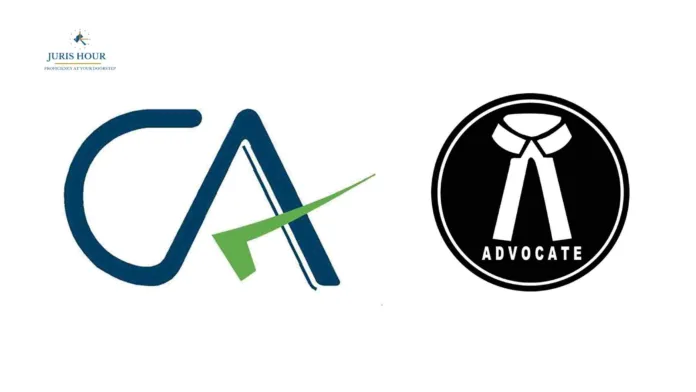In India, two prominent professions – Chartered Accountancy and Advocacy – are regulated by distinct statutory bodies: the Institute of Chartered Accountants of India (ICAI) and the Bar Council of India (BCI), respectively. These bodies prescribe codes of conduct and ethical standards, aimed at maintaining discipline, integrity, and public trust. Despite certain similarities in professional expectations, the two professions differ significantly in terms of regulatory approach, legal privileges, and professional practices.
Regulatory Authorities: ICAI vs. BCI
1. The Institute of Chartered Accountants of India (ICAI)
- Established under the Chartered Accountants Act, 1949.
- Regulates education, licensing, professional standards, and disciplinary proceedings of Chartered Accountants.
- Operates under the administrative control of the Ministry of Corporate Affairs.
2. The Bar Council of India (BCI)
- Constituted under the Advocates Act, 1961.
- Responsible for regulating the legal profession and legal education in India.
- Functions independently through State Bar Councils and does not operate under any ministry.
Code of Conduct: Chartered Accountants vs. Advocates
A. ICAI Code of Ethics for Chartered Accountants
- Emphasizes core values such as integrity, objectivity, professional competence, confidentiality, and professional behavior.
- Prohibits:
- Solicitation and advertising.
- Fee-sharing with non-members.
- Accepting assignments without communicating with the previous auditor.
- Misrepresentation and professional negligence.
- ICAI enforces discipline through its Disciplinary Directorate, Board of Discipline, and Disciplinary Committee.
B. BCI Rules of Professional Conduct for Advocates
- Enshrined in Chapter II of Part VI of the BCI Rules.
- Advocates are bound by duties to the court, client, opponent, and society.
- Key provisions:
- Must act fearlessly and independently in the client’s best interest.
- Must maintain client confidentiality.
- Must not solicit clients or advertise, except for limited personal and professional details.
- May refuse a case unless required under legal aid obligations.
- Disciplinary matters are handled by State Bar Councils, with appeals to the BCI and Supreme Court.
Confidentiality and Legal Privilege
A key distinction lies in the legal privilege attached to client communications.
- Advocates enjoy statutory privilege under Section 126 of the Indian Evidence Act, 1872, which prevents disclosure of any communication made by the client during the course of professional engagement, except in certain limited exceptions. This ensures absolute confidentiality and is legally enforceable in courts and investigations.
- Chartered Accountants, though ethically bound to maintain client confidentiality under the ICAI Code of Ethics, do not enjoy legal privilege. They may be compelled to disclose client communications or documents when summoned by judicial or regulatory authorities, such as the Income Tax Department or Enforcement Directorate. Thus, unlike advocates, CAs cannot withhold information on the grounds of confidentiality in legal proceedings.
Fee Structure and Regulation
There is also a marked difference in how fees are structured and regulated for the two professions:
- Chartered Accountants:
- ICAI does not prescribe a fixed fee schedule, but expects fees to be reasonable, justifiable, and commensurate with the services rendered.
- CAs are expected to charge ethically, avoiding undercutting or fee-sharing arrangements with unqualified persons.
- Professional misconduct includes charging fees based on a percentage of profits or contingent outcomes, except where expressly permitted by law (e.g., insolvency cases under IBC).
- CAs must maintain transparency and cannot solicit clients through fee-based comparisons.
- Advocates:
- The BCI also does not impose any upper or lower limit on the fees charged by advocates.
- However, advocates are free to set their own fees, which can vary widely depending on experience, specialization, seniority, and nature of the matter.
- There is no statutory cap on fees, and it is not considered misconduct to charge high professional fees, even in crores for senior advocates.
- However, in civil cases, contingent fees (i.e., “no win, no fee”) are generally not allowed, as they are considered against public policy.
- Courts have occasionally commented on excessive fees, but no binding regulation restricts such practices.
Comparison Table: Key Difference
| Feature | Chartered Accountants (ICAI) | Advocates (BCI) |
| Regulating Law | Chartered Accountants Act, 1949 | Advocates Act, 1961 |
| Regulatory Body | ICAI (MCA) | BCI (Independent Statutory Body) |
| Code of Conduct | ICAI Code of Ethics, 2020 | BCI Rules, Part VI |
| Solicitation | Prohibited | Prohibited (with minor exceptions) |
| Advertising | Not allowed | Not allowed (with limited personal/professional details) |
| Confidentiality | Ethical duty; not legally protected | Legally privileged (Sec 126, Evidence Act) |
| Fee Structure | Must be reasonable and ethical; no contingency fees | No cap; contingent fees barred in civil matters |
| Legal Privilege | Not available | Available under Evidence Act |
| Disciplinary Authority | ICAI Board of Discipline & Disciplinary Committee | State Bar Councils & BCI (Appellate) |
Conclusion
Both the ICAI and BCI are committed to maintaining high standards of professionalism and integrity. However, their respective codes of conduct reflect the different responsibilities and legal roles played by Chartered Accountants and Advocates.
From confidentiality rights, where advocates enjoy legal privilege that CAs lack, to fee structures, where advocates have broader freedom and flexibility, these distinctions are critical to understanding the boundaries and protections within each profession.
As regulatory scrutiny increases and cross-functional advisory roles evolve, awareness of these differences becomes essential not only for professionals but also for clients, regulators, and institutions relying on their services.
Read More: Smart Way to Invest in SIP In India

